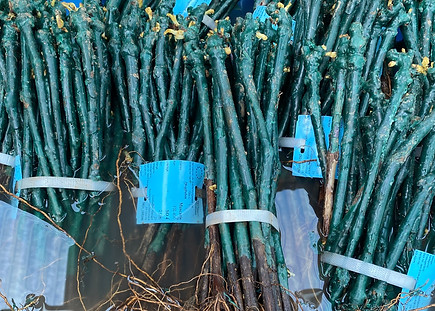
Earth-Friendly Vines™
~ A Brief Overview ~
Traditional and well-known wine making vines such as Chardonnay, Pinot Noir and Sauvignon Blanc are mostly grown in sunnier, warmer and drier climates such as Southern Europe, Australia, and California. This ensures the vines enjoy plenty of sunlight and warmth to fully ripen their grapes, achieving high sugar levels, and thereby producing good-tasting wine.
Vine cultivation in the UK, often referred to as 'cool climate viticulture’, faces challenges of achieving grape ripeness, with plants highly susceptible to diseases caused by the good old British weather! Vineyards in the UK tend to leave grapes on the vines for longer into the autumn in an attempt to fully ripen them and improve the sugar content and acidity balance. These vines are susceptible to plant-health issues from the cooler, wetter and more humid 'cool climate' conditions such as mildew, mould, fungus, rot and other pest issues which can cause damage to, and decimate, the vines and grapes.
In the early days of UK viticulture (1952-1990), vine varieties known to survive cooler and wetter climates were chosen by UK vineyards. The main vines grown were imported German cross-bred varieties such as Bacchus, Huxelrebe, Madeline Angevine, Muller Thurgau, Ottega, Reichensteiner and Schonburger. Together with the French-American hybrid, Seyval Blanc, this accounted for around 75% of the varieties grown in British vineyards. In order to protect vines and grapes from these issues caused by the cooler UK climate, extensive chemical spraying is often used.
Today, a lot of UK vineyards have moved towards vine varieties used in producing English sparkling wine, typically Chardonay, Pinot Noir, and Pinot Mernier. Whether these varieties, or the above Germanic varieties are grown, spraying is required regularly to protect vine health (typically every 10 days or so). This is commonly done with a rotating selection of man-made synthetic chemicals and systemic fungicides that may be absorbed into the vine itself.
This spraying is often carried out as a preventative measure whether or not the vines actually exhibit health issues. Over time, these chemicals can be absorbed into the soil, polluting waterways, and potentially harming the environment.
~ Earth-Friendly Vines™ ~
Here at The Atlantic Vineyard we are practicing what we preach and endeavour to maintain our vines in a sustainable and ecologically friendly way. We are on a journey, exploring new techniques and ways to avoid synthetic chemical treatments entirely. We are working towards being a wholly organic vineyard, and are currently undergoing conversion and accreditation with The Soil Association.
We have planted, and are exclusively growing, 14 new varieties of ecologically and Earth-Friendly Vines, from which we will be making organic and Earth-Friendly wines.
These new varieties of vines have been cultivated in Europe for their quality, character, hardiness and natural disease resistance and are sometimes referred to as PilzWiderstandsfähig (or PIWI), German branding for fungus-resistant vines. These hybrid vine varieties are new crossings of traditional European wine making grape vines (Vitis Vinifera) and American wild vines. These crossings result in vines that have the best taste attributes of the more commonly known varieties, matched with a natural disease resistance to fungal attack, rot and other pests, gained from the American vine parentage.
With their natural disease resistance, these vines need little to no treatment with chemical fungicidal sprays. They are in the main, early ripening, and due to their natural resistance and sometimes thicker grape skins, can be left out later in the year to achieve peak ripening for wine-making. This makes them ideal for ‘cool climate viticulture' (grape growing) and viniculture (winemaking), especially in Cornwall.
~ Our Approach ~
We are on a journey to create organic wines from Earth-Friendly Vines; by growing naturally disease resistant vines and aim to eventually avoid the use of synthetic chemical treatments completely. Our focus is on improving the natural health and biodiversity of the soil in the vineyard. In addition, the reduced use of tractors for spraying and the resulting reduction in soil compaction around the vines will support the natural biodiversity within the soil, which will itself improve the nutrients available to the vines. Hence our motto that ‘’good wine is made in the vineyard’’ and that the health of the soil is absolutely and fundamentally critical, not only to our wine, but to support a thriving ecology across the vineyard.
If you would like to learn more about Earth-Friendly Vines™, please contact us, or follow these links:
https://saltwine.eu/blogs/winemakers/pilzwiderstandsfahige-rebsorten-science-meets-nature
https://www.internationalwinechallenge.com/Canopy-Articles/piwis-the-most-promising-varieties.html










